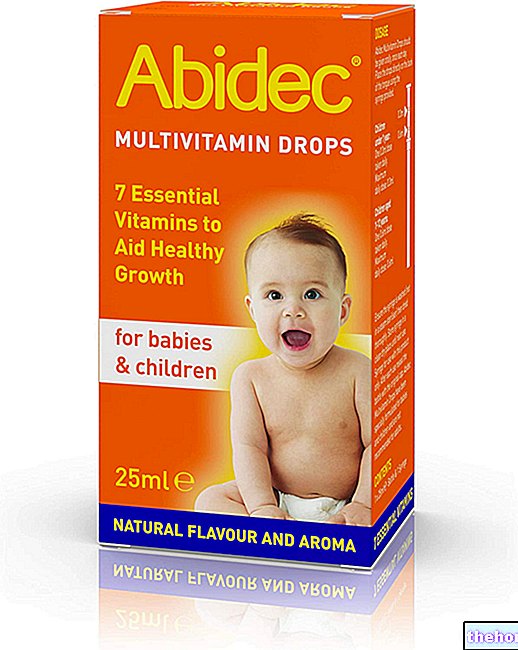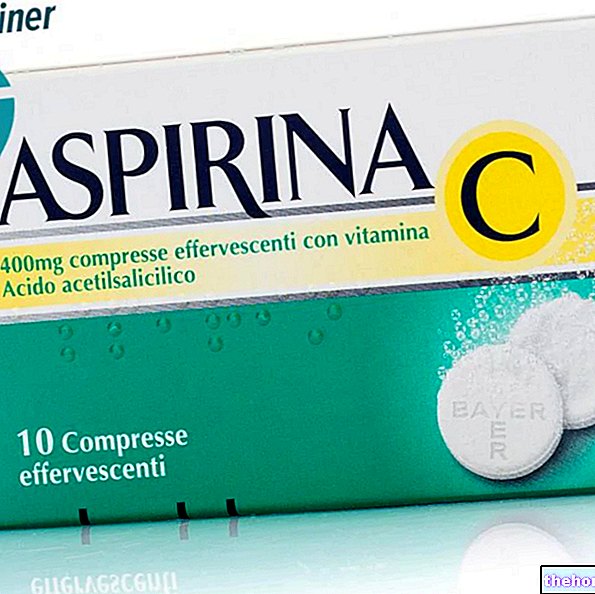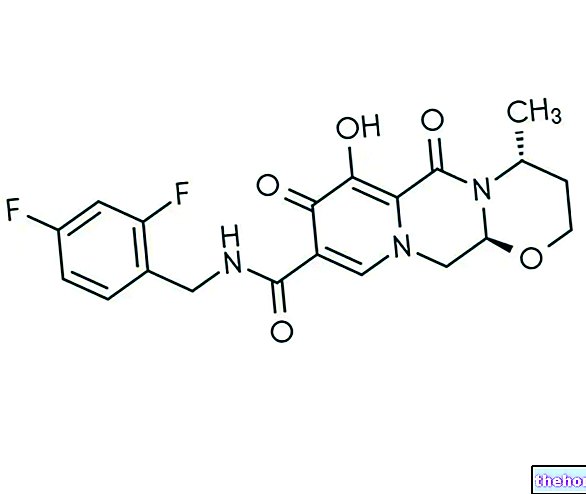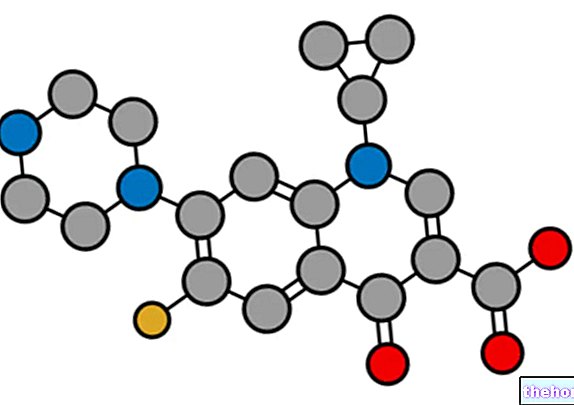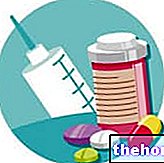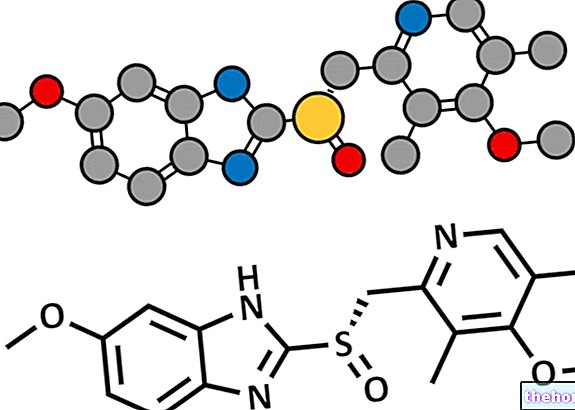TIROSINT ® a drug based on sodium levothyroxine
THERAPEUTIC GROUP: Thyroid preparations

Indications TIROSINT ® Levothyroxine
TIROSINT ® used in all those pathological conditions characterized by reduced thyroid function such as goiter, prophylaxis of relapses after surgery, thyroid hypofunction, inflammatory processes and neoplastic pathologies.
Action mechanism TIROSINT ® Levothyroxine
TIROSINT ® is a drug based on pure levorotatory thyroxine, normally used for replacement therapies in case of reduced thyroid function.
Taken orally, the levothyroxine contained in TIROSINT ® is rapidly absorbed at the gastrointestinal level, conveyed to plasma proteins such as thyroglobulin, prealbumin and to a small extent also to albumin and distributed throughout the body.
Once it reaches the peripheral tissues, it is deprived of an iodine atom by specific deiodases, forming triiodiothyronine, a much more active metabolite, capable of binding specific nuclear receptors, inducing their activation.
From a functional point of view, this hormone allows to modulate various metabolic aspects ranging from thermogenesis to lipid metabolism, from cardiovascular to nervous functions, from muscular to skeletal development, thus justifying the "important symptoms that occur during hypothyroidism and" indispensable need to resort to drug therapy.
Studies carried out and clinical efficacy
1. LEVOTHYROXIN AND SLIMMING: FAT OR WATER?
J Clin Endocrinol Metab. 2011 Jan; 96: E99-103. Epub 2010 Oct 6.
Weight loss after therapy of hypothyroidism is mainly caused by excretion of excess body water associated with myxoedema.
Karmisholt J, Andersen S, Laurberg P.
Very interesting study that analytically evaluates weight loss in patients treated with levothyroxine. Although the treatment can guarantee a significant weight reduction, a more careful analysis of the body composition shows how the fat mass remains almost unchanged justifying the weight loss with the loss of fluids retained by myxedema.
2. LEVOTHYROXIN AND THYROID NODULES
Clin Endocrinol (Oxf). 2002 Nov; 57: 621-8.
Effect of low- and high-dose levothyroxine on thyroid nodule volume: a crossover placebo-controlled trial.
Koc M, Ersoz HO, Akpinar I, Gogas-Yavuz D, Deyneli O, Akalin S.
The administration of levothyroxine at low doses has been found to be particularly effective in reducing the growth of thyroid nodules, without causing serious side effects. The efficacy of this therapy seems to be associated with the inhibitory action on TSH secretion, involved in the pathogenesis and in the development of thyroid nodules.
3. LEVOTHYROXIN AND DEPRESSION
J Affect Disord. 2007 Nov; 103 (1-3): 253-6.
L-thyroxine augmentation of serotonergic antidepressants in female patients with refractory depression.
Łojko D, Rybakowski JK.
The addition of levothyroxine to serotonergic antidepressants used in the treatment of major depression seems to be able to increase the therapeutic effect by reducing the degree of depression measured by specific tests. While this improvement seems important for the depressed patient, the side effects resulting from this combination therapy must be considered.
Method of use and dosage
TIROSINT ® 50/100 mcg tablets of levothyroxine sodium:
while being able to define a therapeutic range between 50 and 200 mcg of levothyroxine per day, the specific dosage can vary significantly from patient to patient according to their therapeutic needs, the severity of the clinical picture and their physio-pathological conditions.
Consequently, it is solely up to the doctor to establish the correct posology, after a "careful evaluation of the patient's state of health.
TIROSINT ® Levothyroxine warnings
Treatment with TIROSINT ® should be preceded by a careful evaluation of the patient's physio-pathological and clinical picture, in order to better manage the therapy and establish the appropriate dosage.
In fact, it is important to remember how high doses or the abuse of thyroid preparations can determine the onset of side reactions, even serious ones.
Consequently, periodic monitoring of serum TSH and transaminase levels is required to evaluate the efficacy of the therapy, the absence of side effects on the liver and, if necessary, to adjust the dosage used.
Headache, drowsiness and other alterations affecting the nervous system, described following the intake of levothyroxine, could alter the patient's normal perceptive and reactive abilities, making it dangerous to carry out activities that require cognitive commitment.
PREGNANCY AND BREASTFEEDING
Although levothyroxine may be secreted into breast milk and cross the placental barrier, the treatment of hypothyroidism in pregnancy with L-thyroxine drugs did not cause serious side effects for the health of the unborn child, when used at therapeutic doses.
It is clear that the entire therapeutic process must be monitored and supervised by your doctor.
Interactions
The crucial role of thyroid hormones in controlling metabolism exposes TIROSINT ® to numerous possible interactions with various active ingredients.
The concomitant intake of levothyroxine and hypoglycemic agents could reduce the therapeutic effect of the latter, preventing the achievement of good glycemic control, while the inhibitory action of thyroxine on coumarin derivatives could expose the patient to severe bleeding.
On the contrary, the simultaneous intake of cholestyramine, drugs containing aluminum, iron and calcium, salicylates, dicumarol, furosemide, clofibrate, phenytoin, glucoriticoids, beta-sympatholytics, amiodarone and iodinated contrast media, estrogens, barbiturates, proguanil, antiepileptics and compounds containing soy it could cause a reduction in the therapeutic effects of TIROSINT ® thus requiring an adjustment of the dosage used.
Contraindications TIROSINT ® Levothyroxine
TIROSINT ® contraindicated in case of untreated adrenal insufficiency, untreated pituitary insufficiency, untreated thyrotoxicosis, acute myocardial infarction, acute myocarditis and pancarditis and hypersensitivity to the active substance or its excipients.
Undesirable Effects - Side Effects
Despite levothyroxine therapy, if properly set up, does not present particularly serious side effects, the widespread abuse of these drugs exposes the patient to clinically relevant adverse reactions.
Cardiovascular disorders of various kinds, behavioral alterations and of the state of consciousness, dermatological reactions of various degrees, gastro-intestinal diseases and osteoporosis define the recurrent symptom range in case of abuse of thyroid hormone products.
Note
TIROSINT ® sold only under medical prescription.
TIROSINT ® falls within the doping class: Hormones and related substances (prohibited in and out of competition)
The information on TIROSINT ® Levothyroxine published on this page may be out of date or incomplete. For a correct use of this information, see the Disclaimer and useful information page.

